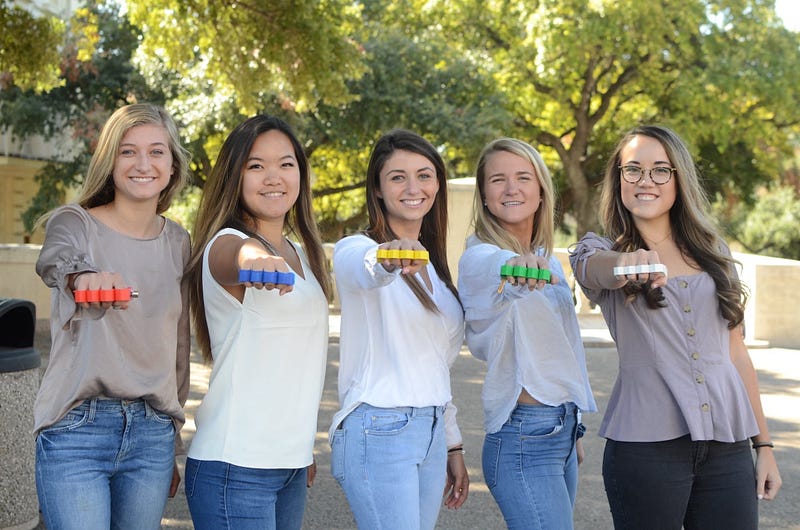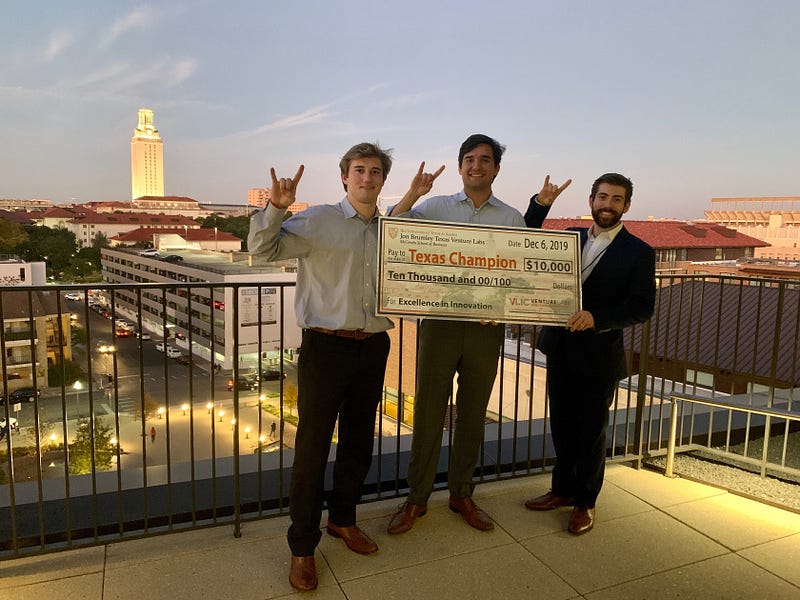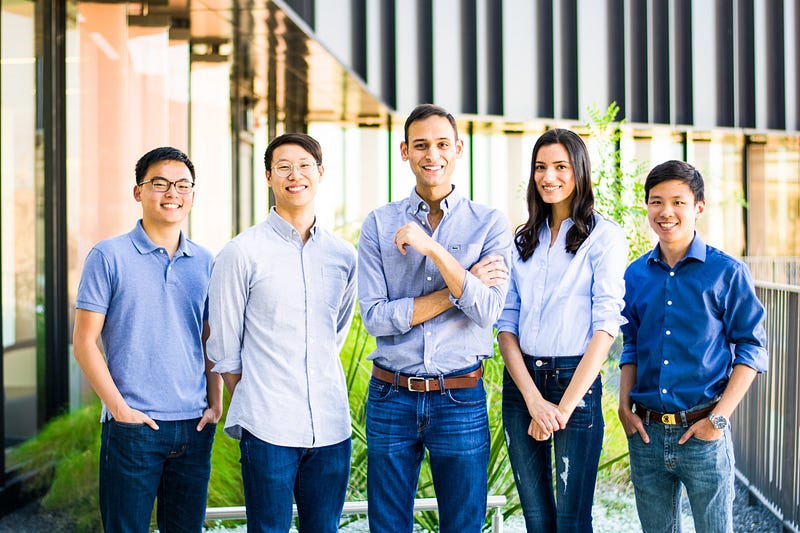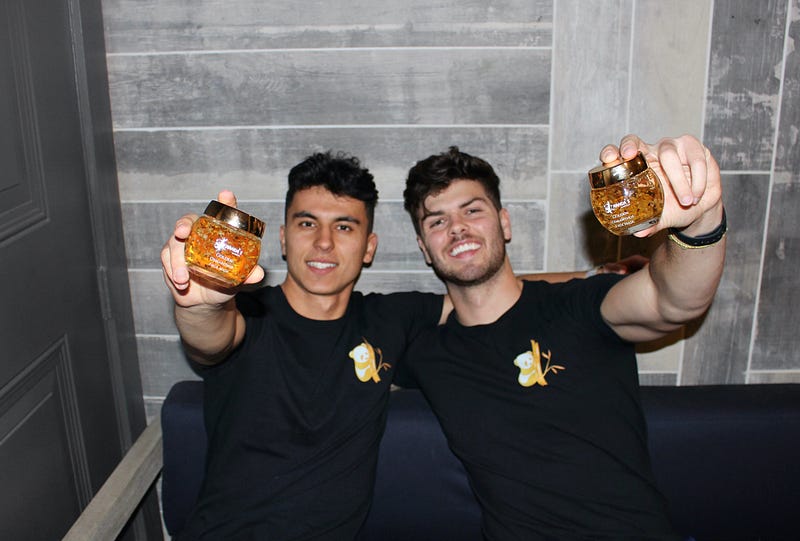Student Startups
Enterprising undergraduates solve problems across campus and around the globe.
Students at the McCombs School of Business aren’t waiting to graduate. They’re already launching new businesses, tapping university mentors, and funding connections. With the new Entrepreneurship Minor, innovative ideas are flourishing. Although the COVID-19 pandemic hobbled many businesses, these students and recent alumni continue to run and even expand their companies.

Pocket Punch: Smart Self-Defense
Students empower peers with self-defense device
To promote student safety, several students pitched Pocket Punch in their marketing class. The 4-in-1 tool arms users with a flashlight, alarm, pepper spray, and plastic knuckles, now legal in Texas for self-defense. Pocket Punch was started by Margy McCallum, Megan Doyle, Ashley Raymond, and Danna Tao, all BBA ’20, and civil engineering senior Sydney Marvin. It won the People’s Choice Award in 2019 at the UT DisrupTexas pitch competition and joined the Longhorn Startup and Genesis incubator programs. The young entrepreneurs want Pocket Punch to become a must-have item on and off campus, and they already have 200 students on the waitlist for their product.
The Dream: “We want people to be prepared — not scared — in any situation,” Raymond says.
Pandemic Pivot: The group planned to open preorders in March, but “I was just overwhelmed by all things COVID-19, so a month later, we were still debating: Is now the right time to launch?” Raymond says. “We decided on yes, because everyone was on their phones and computers a lot more. That’s what helped us get such a good reaction.” Although Pocket Punch has yet to choose a manufacturer, Raymond says preorders should still begin shipping this fall, and some small retailers have expressed interest in selling it in their stores.

Plexus Technologies: Crowded Connection
Wi-Fi-based technology aims to solve spotty cellphone connectivity in crowds
Unreliable wireless service is a source of frustration at festivals, ballgames, conferences, and even ski resorts. Jake Johnson, BBA ’20, Casey Roberts, MBA ’19, and human dimensions of organizations senior James McElroy worked with live-events producer C3 Presents and saw the challenge firsthand at music festival Lollapalooza. The result? Plexus, a private, Wi-Fi-based network that provides cellular connection in crowded areas. The trio plan to license their limited-data technology for use in music festival apps and beyond.
The Dream: “We aim to improve user experience and, more important, create a safer environment for all events and locations,” Johnson says.
Pandemic Pivot: With the pandemic shutting down events where Plexus could be used, the team hit the hold button. Roberts and Johnson focused on personal matters, and McElroy says he is improving his coding skills to upgrade the company once live events return. “I’m the CEO and I started it, so I am taking this as investing a lot of time and money into it to try and eventually get to the point where I know it can be successful,” McElroy says.

HiPR: Easing Ulcers
Siblings patent a cushion to aid those with skin ulcers
A family member’s spinal injury illuminated a little-known problem for Koushalya Sachdev, BBA ’20, and Krishan Sachdev, B.A. ’19. The siblings enlisted a few UT peers, and the result is HiPR Innovation, the first reactive, pressure-relieving cushion. It prevents skin ulcers by redistributing pressure across the patient’s seat.
The Dream: “This is not a disease, it’s a simple problem,” Koushalya says. “Our mission is to improve the lives of everyone affected, using the hardware and software components in our product.”
Pandemic Pivot: With a U.S. patent, the team hopes to enter the market by next spring, as long as COVID-19 does not delay testing by physical therapy centers and hospitals. With support from programs including the student-alumni venture fund Genesis and the Student Entrepreneurship Accelerator and Launch summer program, they are focused on winning grants, meeting investors, and testing for clinical effectiveness. “We’re not getting as quick of responses from hospitals and physicians, because they’re so busy,” Koushalya says. Another challenge was learning how to work together remotely, which was inevitable because Krishan is going to medical school. “We really used this time to learn to create a system and to adapt and to be flexible,” Koushalya says. “It’s really helped us develop our workflow. We were all going to be in different areas as of next year anyway.”

Manda’s Garden: Flower Power
Two students pamper the skin with plants
Michael Neiswander and Albion Zogaj, both BBA ’21, are harnessing an exotic flower to create skin care products. Inspired by Neiswander’s mother, who used ice to treat eye puffiness, and Zogaj’s mother, who used the Japanese gold osmanthus flower, they created an eye mask that combines cold-activated relief with the flower’s anti-inflammatory properties. The founders bootstrapped Manda’s Garden, connecting with sources in Asia for product insights, partnering with manufacturers, and traveling to local conventions to sell the product. Since hitting the market in November 2019, the company’s founders have a full line of products. They are focusing on marketing online, increasing funding, and sharing their brand and mission.
The Dream: “We hope to spread this product as far as possible, while being able to give back to the communities we get it from,” Neiswander says.
Pandemic Pivot: After the pandemic shut down in-person gatherings in March, the pair noticed a decrease in orders. Zogaj said they were also concerned people may be xenophobic toward an Asian brand because COVID-19 originated in China. The two do the packaging, so Zogaj said they started donning gloves and face masks to ensure the products were sanitary. Although new customer acquisition dropped and conventions went virtual, Zogaj says they’re staying afloat. “Luckily, our customers from before were pretty loyal to us, and we were getting repeat orders from people who have tried us and liked it.”
This article appeared in the winter 2020 issue of McCombs magazine. Click on the link to see the full issue.


